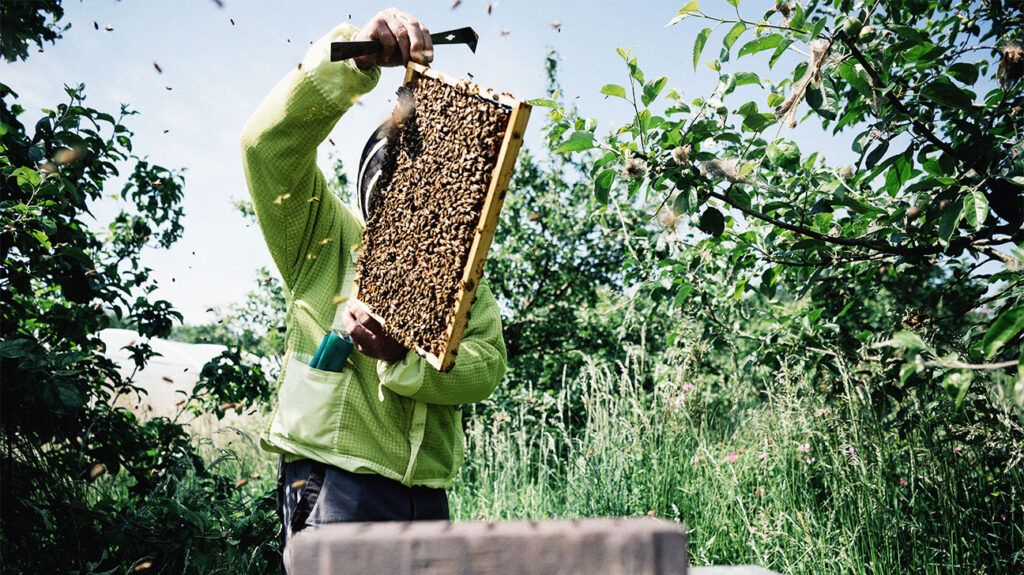Eating local honey may reduce hay fever symptoms. However, very limited scientific evidence supports this, and existing studies tend to have mixed results.
Some believe that the traces of pollen in raw local honey could help the immune system build tolerance to pollen, thereby reducing a person’s hay fever symptoms. This is also the idea behind immunotherapy, a medical treatment for allergies.
However, most people with hay fever are allergic to grass pollen, whereas bees pollinate flowers. As a result, it is unclear if all local honey is helpful.
This article explores whether local honey can help with allergies, the underlying science, potential risks, and other natural treatments for hay fever.

The idea that local honey can help with hay fever is popular. However, a 2020 review found no scientific evidence to support this.
Little research has looked specifically at local honey. This may be because local honey varies in composition depending on location, making it difficult to test.
Some research has looked at other specific types of honey, but these studies have involved low numbers of participants. As a result, these studies do not necessarily prove that all local honey works for hay fever.
Birch pollen honey
A 2011 study of 50 people with a birch pollen allergy found that taking birch pollen honey reduced symptoms in comparison to those taking regular medications.
People taking the birch pollen honey also used antihistamines less frequently than those taking regular honey, although their symptom scores were similar.
Tualang honey
A
The study involved 40 participants who first took a daily dose of an antihistamine for 4 weeks. After this, they took either honey or a placebo for another 2 months.
The researchers found that the group taking the Tualang honey significantly improved allergy symptoms compared to the placebo group. Even after stopping the antihistamines, the honey group continued to feel better, while the placebo group’s symptoms worsened.
The theory behind using local honey for hay fever derives from the principles of immunotherapy. These ideas involve gradually exposing the body to allergens to build tolerance and reduce allergic reactions.
Local honey contains small amounts of pollen from nearby plants. By consuming this honey regularly, people believe the immune system becomes accustomed to the pollen, reducing sensitivity and the severity of allergic reactions over time.
However, most often, people with hay fever are allergic to airborne pollen from grasses and weeds. As bees pollinate flowers, not grass, honey may not contain substantial amounts of the pollen that most with hay fever are allergic to.
While honey has some beneficial properties, it is unclear if it works as an antihistamine.
A
However, these studies involved mice and other animals. Therefore, high quality clinical trials are necessary to confirm whether honey or royal jelly works the same way in humans.
Many proponents of local honey as a hay fever treatment recommend using raw, unprocessed honey because it contains more pollen than processed honey.
However, consuming raw honey has some risks. For one, people with severe pollen allergies may have significant reactions to it.
Both raw and processed honey can also contain Clostridium botulinum spores, which can cause botulism, a potentially serious illness.
Heat-treating and processing honey seems to remove most of the pollen and other contaminants in raw honey, such as bee parts. However, it does not entirely remove the risks, which is why it is essential to avoid giving any honey to infants
If an adult decides to try raw honey, it is essential to source it from reputable producers.
Learn more about raw honey versus regular honey.
A person needs to stop taking local honey if it causes significant allergy symptoms such as hives. They may also need to consult a doctor, who may recommend taking an antihistamine to calm the reaction.
If a person develops anaphylaxis, people need to seek immediate medical attention.
Anaphylaxis: Symptoms and what to do
Anaphylaxis is a severe allergic reaction that can be life threatening. The symptoms develop suddenly and include:
- hives
- swelling of the face or mouth
- wheezing
- fast, shallow breathing
- a fast heart rate
- clammy skin
- anxiety or confusion
- dizziness
- vomiting
- blue or white lips
- fainting or loss of consciousness
If someone has these symptoms:
- Check whether they are carrying an epinephrine pen. If they are, follow the instructions on the side of the pen to use it.
- Dial 911 or the number of the nearest emergency department.
- Lay the person down from a standing position. If they have vomited, turn them onto their side.
- Stay with them until the emergency services arrive.
Some people may need more than one epinephrine injection. If the symptoms do not improve in 5–15 minutes, or they come back, use a second pen if the person has one.
A 2020 review of previous research found evidence supporting some other complementary treatments for allergies, including:
A small 2022 study also found that infrared light therapy inside the nose reduced allergy symptoms. Twenty-three participants tried the therapy daily for 4 weeks.
However, more research with larger numbers of participants is necessary to confirm these results.
While the idea of using local honey to ease hay fever symptoms is appealing, there is no strong evidence supporting its use.
Limited studies have found that certain types of honey ease specific pollen allergies, but this does not mean most local types of honey will have the same effect.
Furthermore, most with hay fever are allergic to grass and weed pollens, while honey contains more flower pollen. This casts doubt on the idea that honey can desensitize the immune system.
More research is necessary to understand if honey benefits people with hay fever. That said, it is anti-inflammatory and can form part of a balanced diet in moderation.
A person needs to speak with a doctor about complementary therapies for allergies before trying them. They also need to avoid giving honey to young infants.
